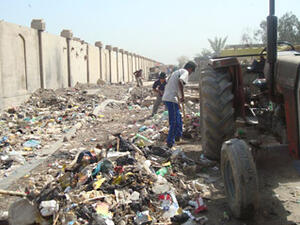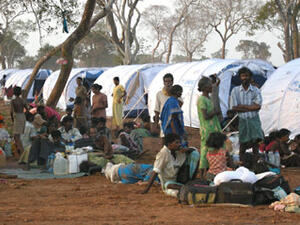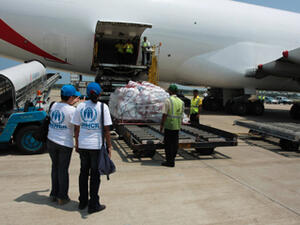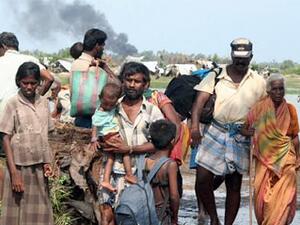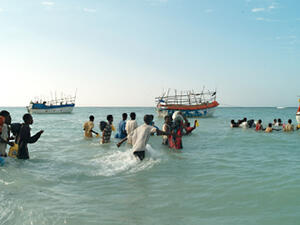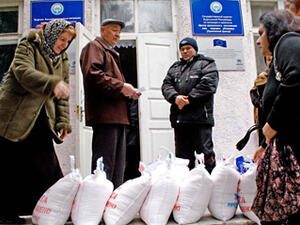UNHCR urges Bangladesh to find new homes for riverbank refugees
UNHCR urges Bangladesh to find new homes for riverbank refugees
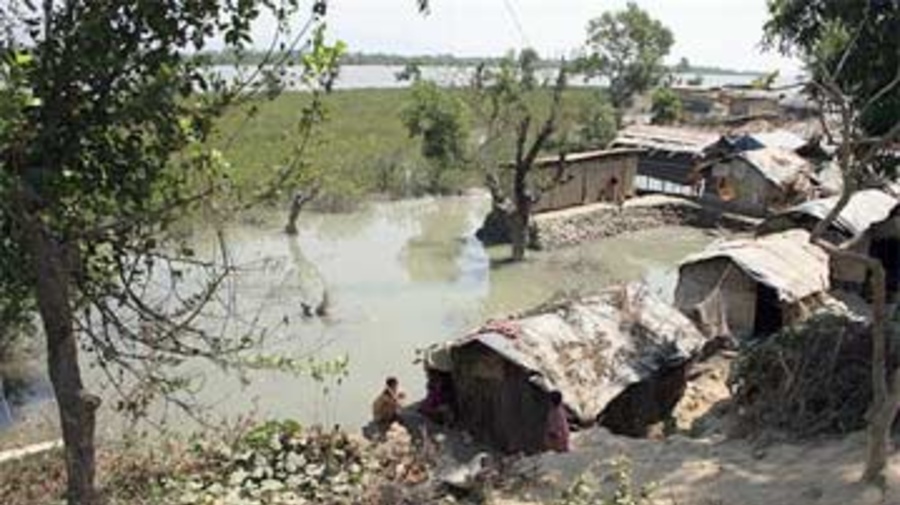
The miserable huts in the unofficial refugee camp at Teknaf in Bangladesh are crowded along a riverbank.
TEKNAF, Bangladesh, March 7 (UNHCR) - All over Bangladesh these days, bulldozers are razing shanty towns and tearing down illegal shops and roadside billboards in a clean-up drive instituted by the caretaker government as part of its state of emergency.
Now the crackdown on illegal structures threatens the miserable shacks of some 6,000 Muslim refugees from Myanmar, whose riverbed settlement perches perilously beside a busy road in Teknaf, 75 kilometres south of Cox's Bazar in south-east Bangladesh.
A threat to demolish the refugees' tattered homes was averted on Wednesday, and the UN refugee agency has offered to work with the Bangladeshi government, donors and partners to find more permanent housing.
"We are under instructions to evacuate from this place," Noor Aysha, a 25-year-old mother of three, said at the makeshift camp on Wednesday. "They are already doing evacuations [from another section of the camp] and of course we are worried. We don't know where to go."
The refugees - regarded by the government as illegal migrants rather than legitimate refugees - set up the camp in October 2004, nearly two years after they had been evicted from rented homes in nearby villages in an earlier crackdown, "simply because we are Myanmarese," as one camp dweller put it.
UNHCR has not been allowed to help them, except to distribute some plastic sheeting last year. The medical non-governmental organisation, Médecins Sans Frontières-Holland, was recently allowed to open a health clinic there.
"These people are of concern to us and we want to help them," said Pia Prytz Phiri, UNHCR representative in Bangladesh. "It is hard to imagine human beings living in much more deplorable conditions than those in Teknaf," she added. "We understand why the government doesn't want them living there, but to move them without having prepared any solution in advance is not very humane."
The refugees' homes are flimsy structures of bamboo, plastic sheets and flattened cement bags on muddy ground, where as many as 16 people crowd together in a room slightly larger than a garden shed. For fully half of each month, the refugees said, high tides flood nearly all the shacks; the inundations bring with them disease, and some children have even drowned. Women spend much of their time repairing the mud foundations of the huts.
The huts are barely a metre apart and abut a busy road, where trucks whizz by on their way to the city of Cox's Bazar. About 25 refugees have been killed on the road in the past two years. "This is our main problem," said Khaleda, a 28-year-old mother of four. "We can't even sit to eat our meal because we have to rush out to control our children and keep them out of the road."
Added Abul Hossain, the father of a toddler: "If we get hit and have serious injuries, or even if someone dies, the drivers just speed off. They don't care - there's no question of a court case or compensation."
This is not the way Khaleda, Abul and the others imagined their refuge would be like when they fled ethnic and religious persecution in Myanmar. They are Muslims from northern Rakhine state, also known as Rohingyas, and say their land was confiscated and they were conscripted to do forced labour for the military government.
Now Khaleda despairs as much of life in Bangladesh as she did in Myanmar. "It's very painful," she said, adjusting her green headscarf. "Life is very difficult. In Bangladesh our life will never be any better." Just getting the food, water and firewood to feed her family is a struggle. Many of the men in the camp work illegally, and some of the women beg rice from local villagers.
UNHCR's Phiri said a solution needed to be found for this group of refugees, while adding that "what we don't want to do is to set up a formal camp." The refugee agency already runs two official camps south of Cox's Bazar that together house some 26,000 Rohingya refugees.
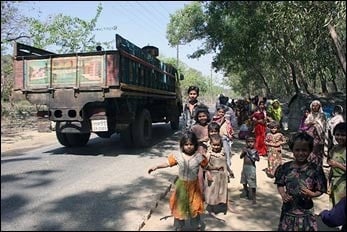
Makeshift Teknaf camp is wedged tightly between a river and a busy highway, which is very dangerous for the refugee children. Some have lost their lives to speeding trucks.
Jim Worrall, head of the UNHCR sub-office in Cox's Bazar, suggested that the simplest thing "would be to allow the Teknaf refugees just to go back to the villages where they were living peacefully with local people before 2004."
Among the flimsy huts of Teknaf, meanwhile, the refugees await their fate with resignation rather than anger. Said Noor Aysha meekly: "If someone can give us shelter somewhere else, we would very much appreciate it."
By Kitty McKinsey in Teknaf, Bangladesh




